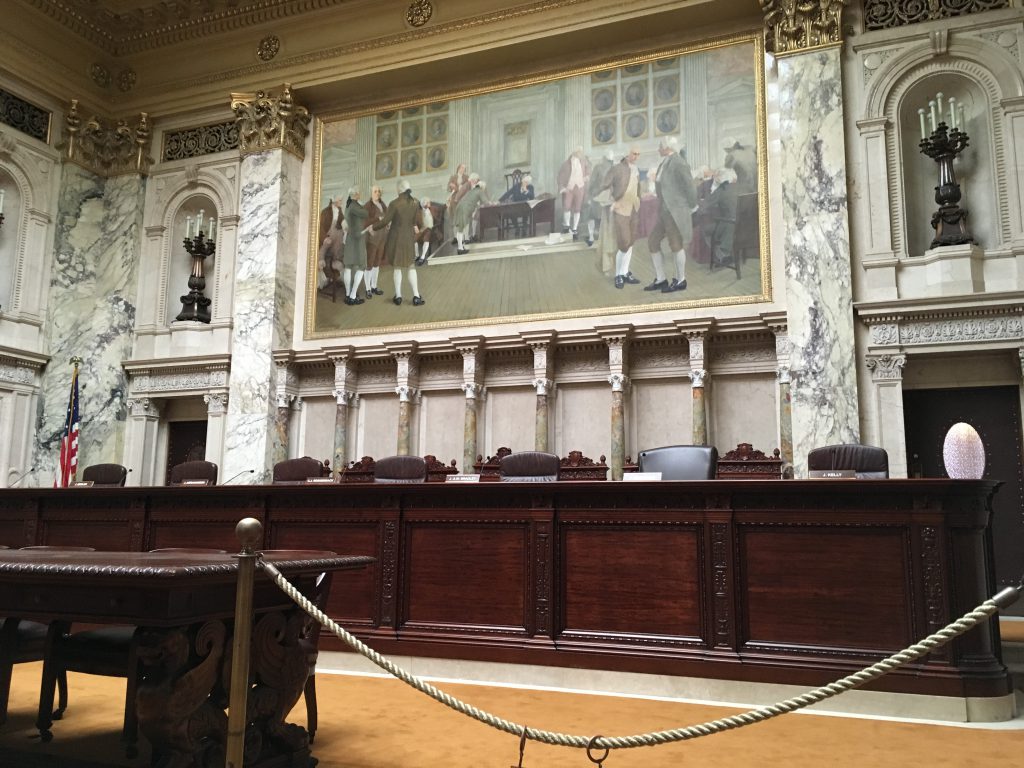Redistricting Case Returns to State Supreme Court
On appeal, U.S. Supreme Court rejected maps approved by the state's high court.
The clock is ticking for the Wisconsin Supreme Court to announce how it will choose the state’s new legislative redistricting plan after the U.S. Supreme Court rejected the last one.
There are a few ways the process could play out, including scenarios where the state Supreme Court endorses maps drawn by Gov. Tony Evers that are nearly identical to the ones the U.S. Supreme Court just shot down.
GOP lawmakers and the conservative Wisconsin Institute for Law and Liberty immediately appealed, and on Wednesday, the U.S. Supreme Court issued a 7-2 ruling that gave Republicans most of what they wanted.
The U.S. Supreme Court ruled that Evers and the Wisconsin Supreme Court had improperly applied the federal Voting Rights Act in the drawing of an additional majority-Black Assembly district in Milwaukee. The current state Assembly map has six majority-Black Assembly districts. Evers’ plan included a seventh.
“Essentially, the U.S. Supreme Court was saying that the Wisconsin Supreme Court didn’t properly show its work,” said Professor Robert Yablon, a redistricting expert at the University of Wisconsin-Madison Law School.
But Yablon said the U.S. Supreme Court’s ruling did not close the door on the governor’s plan if he can demonstrate to the Wisconsin Supreme Court that the additional majority-Black district was necessary.
Attorneys for Evers filed a letter with the Wisconsin Supreme Court Thursday urging justices to do just that, and giving parties to the case roughly a week to file briefs on Voting Rights Act issues raised by the U.S. Supreme Court.
The quick turnaround is necessary because candidates are scheduled to begin circulating nominating petitions on April 15 to run in the new legislative districts.
“While time is of the essence, this Court already has analyzed the existing proposals and need not revisit the large majority of its existing decision,” wrote Assistant Attorney General Anthony Russomanno.
Russomanno also suggested that if the Wisconsin Supreme Court wanted, Evers could submit an alternative plan.
“If this Court desires, the Governor is prepared to submit changes to the Milwaukee VRA districts that would instead create six majority-minority Black districts,” he wrote.
The Legislature submitted its own letter to the state Supreme Court criticizing Evers’ suggestions, saying that if the governor had evidence to bolster his Voting Rights Act argument, he should have submitted it months ago.
The Legislature urged the court to adopt the maps they passed, and Evers vetoed last year. Those maps included five majority-Black Assembly districts, which is one fewer than under the current Legislative map. Evers’ letter to the state Supreme Court argued that would pose its own Voting Rights Act problems.
In addition to the filings on the state maps, Wisconsin’s five Republican members of the U.S. House of Representatives filed a motion Wednesday urging the state Supreme Court to reconsider its decision choosing Evers’ version of a U.S. congressional map.
While the U.S. Supreme Court sided with Republicans in the state legislative redistricting appeal, they denied a GOP appeal of the congressional map.
“Since the U.S. Supreme Court turned away that petition, it seems like the (congressional) map that the Wisconsin Supreme Court had put in place will be the map,” Yablon said. “I think it’s unlikely that there is going to be any further action with respect to the congressional districts.”
Whatever the Wisconsin Supreme Court decides will likely again hinge on conservative swing Justice Brian Hagedorn, who sided with conservatives in the ruling ordering a “least changes” map and sided with liberals in the decisions that sided with Evers.
Listen to the WPR report here.
Redistricting back in Wisconsin Supreme Court’s hands following SCOTUS reversal was originally published by Wisconsin Public Radio.
More about the Gerrymandering of Legislative Districts
- Without Gerrymander, Democrats Flip 14 Legislative Seats - Jack Kelly, Hallie Claflin and Matthew DeFour - Nov 8th, 2024
- Op Ed: Democrats Optimistic About New Voting Maps - Ruth Conniff - Feb 27th, 2024
- The State of Politics: Parties Seek New Candidates in New Districts - Steven Walters - Feb 26th, 2024
- Rep. Myers Issues Statement Regarding Fair Legislative Maps - State Rep. LaKeshia Myers - Feb 19th, 2024
- Statement on Legislative Maps Being Signed into Law - Wisconsin Assembly Speaker Robin Vos - Feb 19th, 2024
- Pocan Reacts to Newly Signed Wisconsin Legislative Maps - U.S. Rep. Mark Pocan - Feb 19th, 2024
- Evers Signs Legislative Maps Into Law, Ending Court Fight - Rich Kremer - Feb 19th, 2024
- Senator Hesselbein Statement: After More than a Decade of Political Gerrymanders, Fair Maps are Signed into Law in Wisconsin - State Senate Democratic Leader Dianne Hesselbein - Feb 19th, 2024
- Wisconsin Democrats on Enactment of New Legislative Maps - Democratic Party of Wisconsin - Feb 19th, 2024
- Governor Evers Signs New Legislative Maps to Replace Unconstitutional GOP Maps - A Better Wisconsin Together - Feb 19th, 2024
Read more about Gerrymandering of Legislative Districts here






















